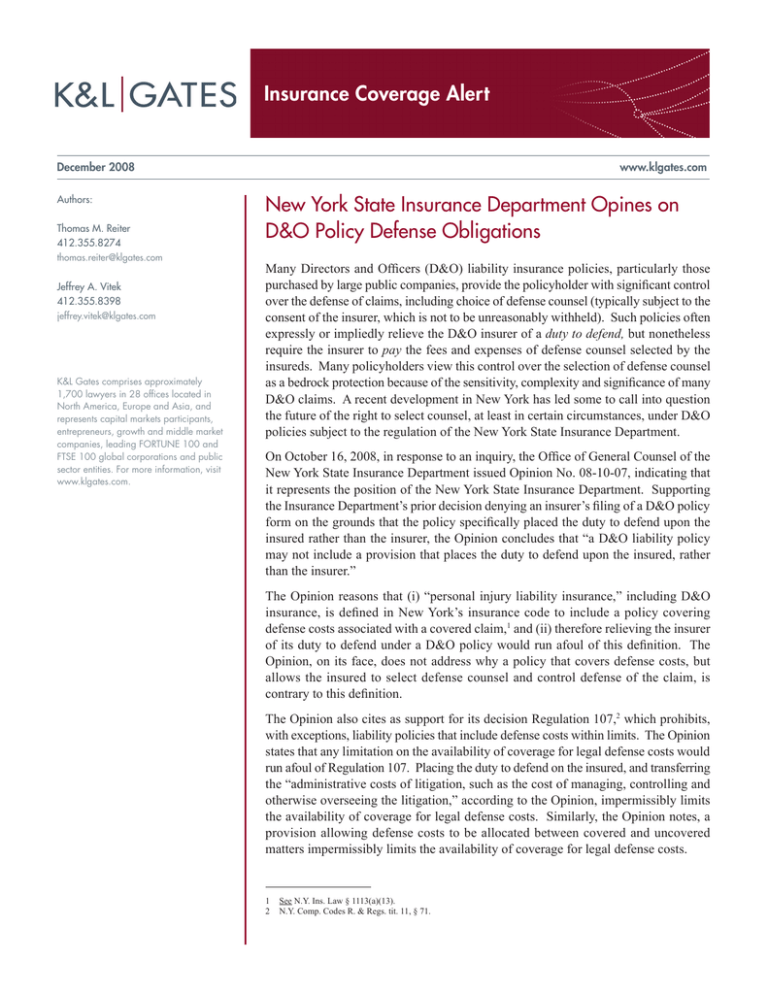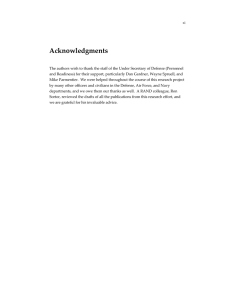
Insurance Coverage Alert
December 2008
Authors:
Thomas M. Reiter
412.355.8274
thomas.reiter@klgates.com
Jeffrey A. Vitek
412.355.8398
jeffrey.vitek@klgates.com
K&L Gates comprises approximately
1,700 lawyers in 28 offices located in
North America, Europe and Asia, and
represents capital markets participants,
entrepreneurs, growth and middle market
companies, leading FORTUNE 100 and
FTSE 100 global corporations and public
sector entities. For more information, visit
www.klgates.com.
www.klgates.com
New York State Insurance Department Opines on
D&O Policy Defense Obligations
Many Directors and Officers (D&O) liability insurance policies, particularly those
purchased by large public companies, provide the policyholder with significant control
over the defense of claims, including choice of defense counsel (typically subject to the
consent of the insurer, which is not to be unreasonably withheld). Such policies often
expressly or impliedly relieve the D&O insurer of a duty to defend, but nonetheless
require the insurer to pay the fees and expenses of defense counsel selected by the
insureds. Many policyholders view this control over the selection of defense counsel
as a bedrock protection because of the sensitivity, complexity and significance of many
D&O claims. A recent development in New York has led some to call into question
the future of the right to select counsel, at least in certain circumstances, under D&O
policies subject to the regulation of the New York State Insurance Department.
On October 16, 2008, in response to an inquiry, the Office of General Counsel of the
New York State Insurance Department issued Opinion No. 08-10-07, indicating that
it represents the position of the New York State Insurance Department. Supporting
the Insurance Department’s prior decision denying an insurer’s filing of a D&O policy
form on the grounds that the policy specifically placed the duty to defend upon the
insured rather than the insurer, the Opinion concludes that “a D&O liability policy
may not include a provision that places the duty to defend upon the insured, rather
than the insurer.”
The Opinion reasons that (i) “personal injury liability insurance,” including D&O
insurance, is defined in New York’s insurance code to include a policy covering
defense costs associated with a covered claim,1 and (ii) therefore relieving the insurer
of its duty to defend under a D&O policy would run afoul of this definition. The
Opinion, on its face, does not address why a policy that covers defense costs, but
allows the insured to select defense counsel and control defense of the claim, is
contrary to this definition.
The Opinion also cites as support for its decision Regulation 107,2 which prohibits,
with exceptions, liability policies that include defense costs within limits. The Opinion
states that any limitation on the availability of coverage for legal defense costs would
run afoul of Regulation 107. Placing the duty to defend on the insured, and transferring
the “administrative costs of litigation, such as the cost of managing, controlling and
otherwise overseeing the litigation,” according to the Opinion, impermissibly limits
the availability of coverage for legal defense costs. Similarly, the Opinion notes, a
provision allowing defense costs to be allocated between covered and uncovered
matters impermissibly limits the availability of coverage for legal defense costs.
1 See N.Y. Ins. Law § 1113(a)(13).
2 N.Y. Comp. Codes R. & Regs. tit. 11, § 71.
Insurance Coverage Alert
In response to the inquirer’s assertion that
sophisticated insureds prefer to bear the duty to defend
as a means to control the litigation, the Opinion states
that the Insurance Department “conceivably would
approve a policy filing under which the insured has
an option to exercise some degree of control over
or significant participation in the defense of a claim,
provided the insurer maintains the ultimate duty
to defend.”
Understandably, there has been some concern
about the impact this Opinion may have on the
long-standing and widely accepted arrangement
between insurers and many insureds with respect
to the defense of D&O claims. These concerns
may be overstated, at least for the time being. As
a preliminary matter, the Opinion does not purport
to apply to any forms not subject to filing with the
New York State Insurance Department. Nor does
the Opinion speak to the enforceability of policy
wording, let alone state that a policyholder should
be deprived of rights to select counsel. Moreover,
the Opinion is not a statutory or regulatory
pronouncement and, as such, numerous decisions
have held that it would not be binding on courts.3
There appears to be no report that the Insurance
Department has taken steps to prohibit the issuance
of new policies on previously approved forms that
place the duty to defend on the insured, though
there has been some suggestion that the Insurance
Department may promulgate regulations to do
so. It would appear, however, that the New York
Insurance Department may not approve new D&O
forms that continue to place the duty to defend on
the insured.
With regard to action that may be taken, the Opinion
itself potentially could be revised. In a December
11, 2008 online article, the insurance trade
publication, National Underwriter P&C, reported
that Robert H. Easton, deputy superintendent
and general counsel for the New York Insurance
Department, said in a statement that “if it were
demonstrated that the guidance provided by the
opinion somewhat misapprehended or overlooked
controlling legal authority that compels a different
result, OGC would—as is always the case—
entertain revisiting the inquiry in question.” 4
Interested parties might consider lodging additional
inquiries with the Insurance Department in order
to prompt reconsideration. Additionally, any party
that is subject to an adverse determination by the
Insurance Department can consider challenging
that determination in court through an Article 78
proceeding.5 Under New York law, Article 78
proceedings provide the mechanism for judicial
review of administrative agency determinations.
In the meantime, policyholders, brokers and the
insurance community generally will undoubtedly
monitor the activities of the Insurance Department,
including any proposed regulations, regarding this
important subject.
________________________________
3 S
ee, e.g., Park Radiology P.C. v. Allstate Ins. Co., 769 N.Y.S.2d 870 (N.Y.
Civ. Ct. 2003); Marigliano v. New York Cent. Mut. Fire Ins. Co., 831
N.Y.S.2d 697, 703 (N.Y. Civ. Ct. 2007); State Farm Mut. Auto. Ins. Co. v.
Mallela, 372 F.3d 500, 506 (2d Cir. 2004).
4 D
aniel Hayes, Control of D&O Counsel Opinion Causes N.Y.
Controversy, National Underwriter P&C, December 11, 2008, at http://
www.propertyandcasualtyinsurancenews.com/cms/nupc/Breaking%20
News/2008/12/11-NYOPINION-dh.
5 See N.Y. C.P.L.R. 7801-7806.
K&L Gates comprises multiple affiliated partnerships: a limited liability partnership with the full name K&L Gates LLP qualified in Delaware and
maintaining offices throughout the U.S., in Berlin, in Beijing (K&L Gates LLP Beijing Representative Office), and in Shanghai (K&L Gates LLP
Shanghai Representative Office); a limited liability partnership (also named K&L Gates LLP) incorporated in England and maintaining our
London and Paris offices; a Taiwan general partnership (K&L Gates) which practices from our Taipei office; and a Hong Kong general
partnership (K&L Gates, Solicitors) which practices from our Hong Kong office. K&L Gates maintains appropriate registrations in the
jurisdictions in which its offices are located. A list of the partners in each entity is available for inspection at any K&L Gates office.
This publication is for informational purposes and does not contain or convey legal advice. The information herein should not be used or
relied upon in regard to any particular facts or circumstances without first consulting a lawyer.
©1996-2008 K&L Gates LLP. All Rights Reserved.
December 2008 | 2


